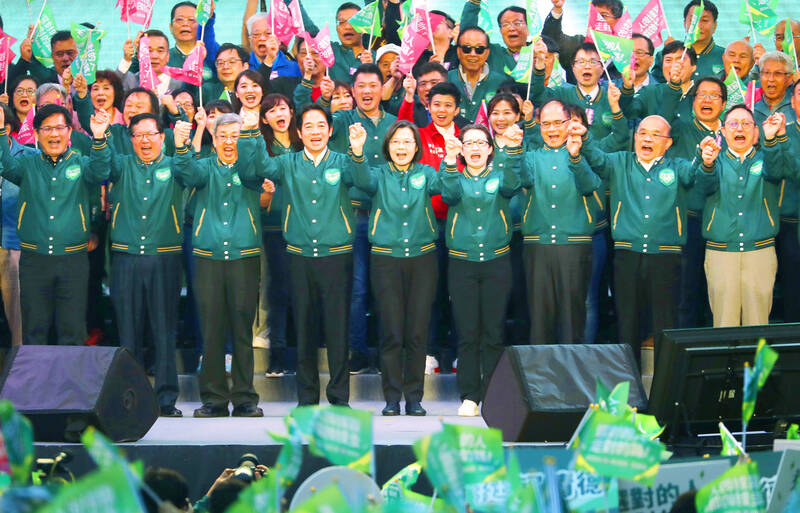Vice President Willam Lai (賴清德), the Democratic Progressive Party (DPP) presidential candidate, yesterday said he and his running mate, Hsiao Bi-khim (蕭美琴), are the choice for a responsible and stable government as he criticized the Chinese Nationalist Party (KMT) and Taiwan People’s Party of steering the nation to be more dependent on China.
“The KMT claimed we can only depend on China for our economy. That time has passed. With Taiwan’s economic strength, we need not and must not go back to where we were,” Lai told the crowd at the rally held at the launch of his national campaign headquarters in Taipei.
Lai said his opponents have called for a controversial cross-strait service trade agreement with China, accepting the so-called “1992 consensus” and recognizing Taiwan and China as “one family on both sides of the Taiwan Strait” (兩岸一家親), adding that the KMT even said they want to allow Chinese students to work in Taiwan.

Photo: Chiang Ying-ying, AP
The “1992 consensus” — a term that former Mainland Affairs Council chairman Su Chi (蘇起) in 2006 admitted making up in 2000 — refers to a tacit understanding between the KMT and the Chinese Communist Party that both sides of the Taiwan Strait acknowledge there is “one China,” with each side having its own interpretation of what “China” means.
“Allowing young people from China to work in Taiwan is to solve Beijing’s youth unemployment problem at the expense of Taiwanese young people’s future,” Lai said. “We cannot entrust our country to politicians of opposition parties, who want to give up our sovereignty, sacrifice our economic autonomy, tolerating the social impact in exchange for peace across the Taiwan Strait.”
As peace across the Taiwan Strait has become a global issue, the world is watching the direction Taiwan is heading and wants to increase partnerships with Taiwan, he said.
“This election is a choice on the direction Taiwan is taking. Choosing the Lai-Hsiao camp is to trust in Taiwan, a country that continues to open itself to the world,” Lai said.
Hsiao said she and Lai would continue the stable and steady leadership of President Tsai Ing-wen (蔡英文), so that Taiwanese can face the world with pride and dignity.
Tsai in her speech stumping for the Lai-Hsiao ticket at the rally said that next month’s presidential election is not a choice between war and peace, but a choice for Taiwanese to have peace with dignity.
“Everybody wants peace, and nobody wants war. However, we do not want Hong Kong-style peace. We want peace with dignity,” Tsai said.

CHANGING LANDSCAPE: Many of the part-time programs for educators were no longer needed, as many teachers obtain a graduate degree before joining the workforce, experts said Taiwanese universities this year canceled 86 programs, Ministry of Education data showed, with educators attributing the closures to the nation’s low birthrate as well as shifting trends. Fifty-three of the shuttered programs were part-time postgraduate degree programs, about 62 percent of the total, the most in the past five years, the data showed. National Taiwan Normal University (NTNU) discontinued the most part-time master’s programs, at 16: chemistry, life science, earth science, physics, fine arts, music, special education, health promotion and health education, educational psychology and counseling, education, design, Chinese as a second language, library and information sciences, mechatronics engineering, history, physical education

The Chinese military has boosted its capability to fight at a high tempo using the element of surprise and new technology, the Ministry of National Defense said in the Quadrennial Defense Review (QDR) published on Monday last week. The ministry highlighted Chinese People’s Liberation Army (PLA) developments showing significant changes in Beijing’s strategy for war on Taiwan. The PLA has made significant headway in building capabilities for all-weather, multi-domain intelligence, surveillance, operational control and a joint air-sea blockade against Taiwan’s lines of communication, it said. The PLA has also improved its capabilities in direct amphibious assault operations aimed at seizing strategically important beaches,

The High Prosecutors’ Office yesterday withdrew an appeal against the acquittal of a former bank manager 22 years after his death, marking Taiwan’s first instance of prosecutors rendering posthumous justice to a wrongfully convicted defendant. Chu Ching-en (諸慶恩) — formerly a manager at the Taipei branch of BNP Paribas — was in 1999 accused by Weng Mao-chung (翁茂鍾), then-president of Chia Her Industrial Co, of forging a request for a fixed deposit of US$10 million by I-Hwa Industrial Co, a subsidiary of Chia Her, which was used as collateral. Chu was ruled not guilty in the first trial, but was found guilty

DEADLOCK: As the commission is unable to forum a quorum to review license renewal applications, the channel operators are not at fault and can air past their license date The National Communications Commission (NCC) yesterday said that the Public Television Service (PTS) and 36 other television and radio broadcasters could continue airing, despite the commission’s inability to meet a quorum to review their license renewal applications. The licenses of PTS and the other channels are set to expire between this month and June. The National Communications Commission Organization Act (國家通訊傳播委員會組織法) stipulates that the commission must meet the mandated quorum of four to hold a valid meeting. The seven-member commission currently has only three commissioners. “We have informed the channel operators of the progress we have made in reviewing their license renewal applications, and